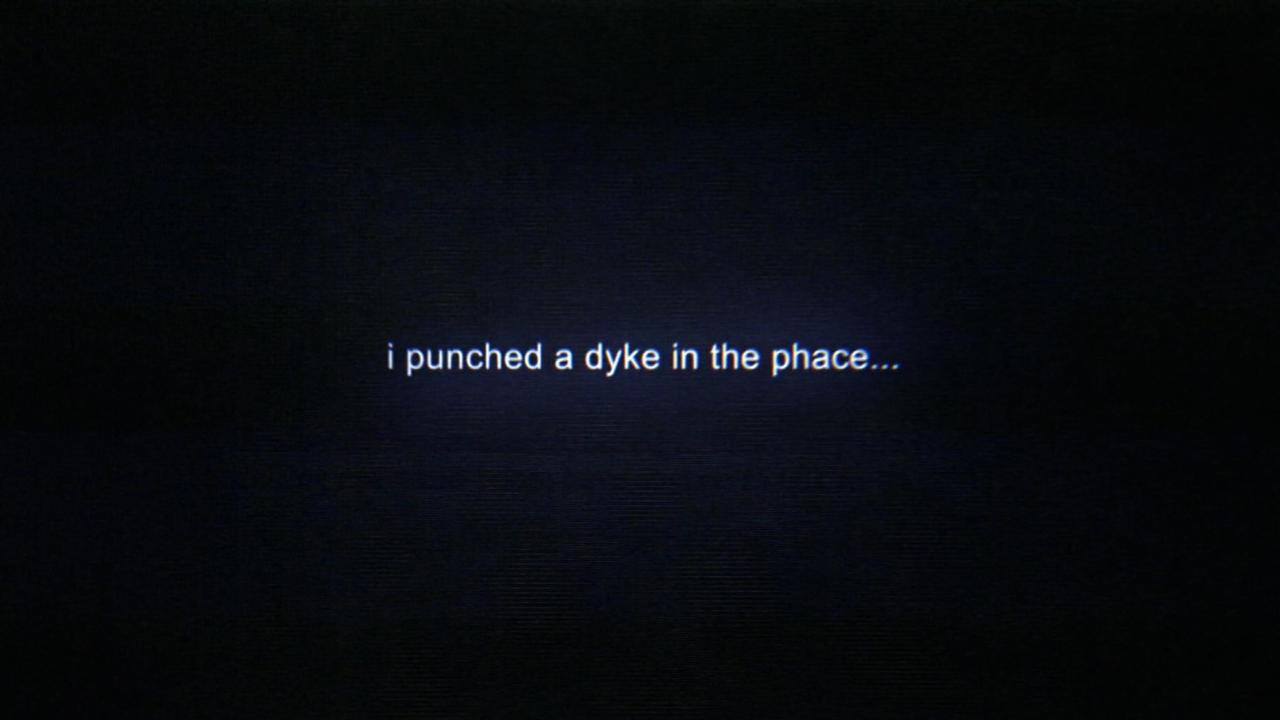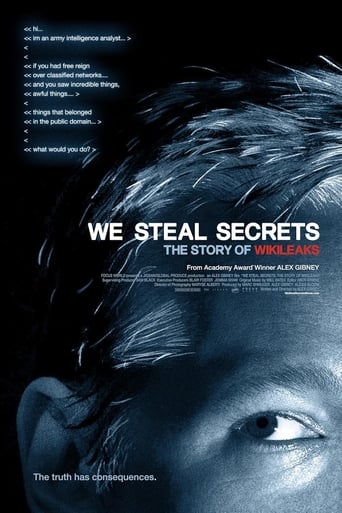Matcollis
This Movie Can Only Be Described With One Word.
Tedfoldol
everything you have heard about this movie is true.
Contentar
Best movie of this year hands down!
SparkMore
n my opinion it was a great movie with some interesting elements, even though having some plot holes and the ending probably was just too messy and crammed together, but still fun to watch and not your casual movie that is similar to all other ones.
lavatch
This 2013 documentary film by Alex Gibney focuses on the enormous Wikileaks data dump of 2010, which was prompted by the massive files released by Bradley (Chelsea) Manning. The filmmaker takes an open-minded and balanced approach to this controversial topic. While Gibney was unwilling to pay the $1 million asking price for an interview with Julian Assange, there is still abundant footage and sound bytes of Assange in his own words.The film is successful in raising the ethical concerns about whether such classified information as strategic military data should be in the public domain. The position of Julian Assange is clearly stated in the film: "Information should be free." In this regard, Assange was breaking new ground in using his computer skills to release a video of war atrocities in Iraq when civilian deaths resulted from American military incompetence. Of course, the video footage drives home Assange's point when the driver of a truck was taking his kids to school when he was killed, and a bystander's camera was mistaken for a weapon, prior to the bombing. This kind of information was aired nightly during the Vietnam War. Today, it is not. Thus, the importance of accountability to the American public.The opposing position presented in the film is that it is necessary for the military to keep secrets to protect those who are engaged in a covert operations. This position is argued in the film by Michael Haden, a retired general and former Director of the CIA. The film's title, "We Steal Secrets" is a line spoken in the film by Haden, as he argues that the nature of war in the twenty-first century demands secrecy.But Haden's countervailing argument about mandatory secrecy does not hold up under close scrutiny. Haden believes that the American public must be kept in the dark about issues that HE deems imperative to national security. This paternalistic attitude is at the heart of why there have been so many needless wars in American history of the past century when bureaucrats, as opposed to elected officials are making decisions of policy and shaping our history as a nation. Haden was not an elected official, hence, the importance of Hayden keeping the Congress and Americans apprised of the protracted wars. As an apologist for state secrecy, Haden was also proven wrong about the computer skills of Bradley (Chelsea) Manning that allowed Manning to store images even after he had assaulted his female supervisor and was relegated to the mail room. There appears to be no concern from Haden about the ease of access to United States government classified materials that led to their eventual dissemination to the public. The ethical issues raised in the film appear to be tied directly to bureaucratic incompetence on the part of leaders like Michael Haden.Towards the end of this long documentary, the film went off the rails by spending far too much time on the allegations of sexual misconduct of Julian Assange (the rape charges against him were eventually dropped in Sweden in 2017). There is also too much time wasted on the personal sexual identity and the incarceration of Bradley Manning. (President Obama commuted the sentence of Bradley Manning, who had become Chelsea Manning by early 2017). So, where does that leave us now? ANSWER: Probably in the same state of confusion, controversy, and public apathy about the secrecy issue as when Assange was using the handle of "Mendax" as a teenager computer geek.
rawzza
I watched this entire documentary wondering why it so closely focused on Bradley Manning's sexuality. This idea that Bradley Manning wanted to be a women and that he liked men was constantly reinforced to the point where it seemed that his actions were a result of a messed up state of mind. His actions were somewhat selfless yet he was portrayed as some as a pervert who craved attention. I don't know whether any of it was true, but I feel that it was totally blown out of proportion. The film maker never secured an interview with Assange which really brings into the question, the legitimacy of every so called "fact" presented. a lot of the information presented was highly focused on the negative side. We are given a sense that Assange is a self destructive man, he wants to be a star, he wants to travel from place to place and have children with many different women. This is of course speculation and very little evidence is brought to the table. It is very hard to know what is true and what is false. I feel that this documentary almost seemed to make out the free speech was wrong, that only deranged fools stand for it. If you watch it, be aware that it is very one sided.
deep diver
I was really interested to see this film for a while now. Finally I got excited and down to it today and, unfortunately, I was in for a major surprise.I am trying to remember when was the last time I've seen such a technical feat of twisting things to their bare credible minimum. Spoiler alert! The bias is so forced that portraying Assange as a self centered paranoid needs being followed by his dancing, his stupidest off the record remarks to ever hit a camera, and of course Lamo crying a full minute for having to send Manning to prison. On the other hand of course, because of Lamo betraying his trust, Manning faced a life - to death sentence (year one being in solitary confinement tortured and sleep deprived by the government for daring to finally expose their crimes). And one more for Lamo. He "leaked" this person to the authorities (knowing Mannings' life would get in danger), so that Mannings' leaks might not put people's lives in danger. Morals. A numbers game. Imagine my surprise, actually (and still) liking Lamo for what he stands for.So basically, (spoiler alert): Assange - selfish weirdo, Lamo - tough moral call, Manning - gender crisis person on the edge, Wikileaks - OK, (but don't leak names, because murderers and traitors could face risks). Oh well, I can almost see that logic, beyond the piles of thousands of annoying dead bodies of murdered people and hundreds of rich pockets. Anyway. Thank you Alex Gibney for this one. Just remember, we do make the world what it really is.
Shilpa Sehgal
I came across " We Steel Secrets" while browsing Netflix one night and started watching it at 1 in the night...wanted to watch something for 15 minutes as I got ready to sleep and boy I got hooked and sat up 2 hours to watch the entire documentary!I am not sure if 'Current History' is an official genre of films but this movie should fall under 'Current History Genre' …. 'History' because it is something that happened in the past....'Current' because 'I' and a lot of people ' currently' inhabiting the planet have live through it.I like watching movies on 'Current History'…it helps me catch up!I knew about Julian Assange/Wiki leaks but had not really followed the story closely. This two hour documentary give a wonderful synopsis of the 2-3 years of the rise and fall of Wiki-Leaks. It is not a biased view for or against Julian Assange, I though it was a well rounded portrayal. But It was Bradley that my heart actually went out to! I think Bradley Chelsey/Edward…whatever you want to call him/her was the actual hero and the sufferer in the whole story. I wish him luck. I will now follow this story actively...Overall I would recommend you watch "We Steel Secrets" …it is informative and engaging even though it is a little longer than what a documentary should ideally be! Not sure if you will enjoy it if you have followed the story closely as it unfolded..

